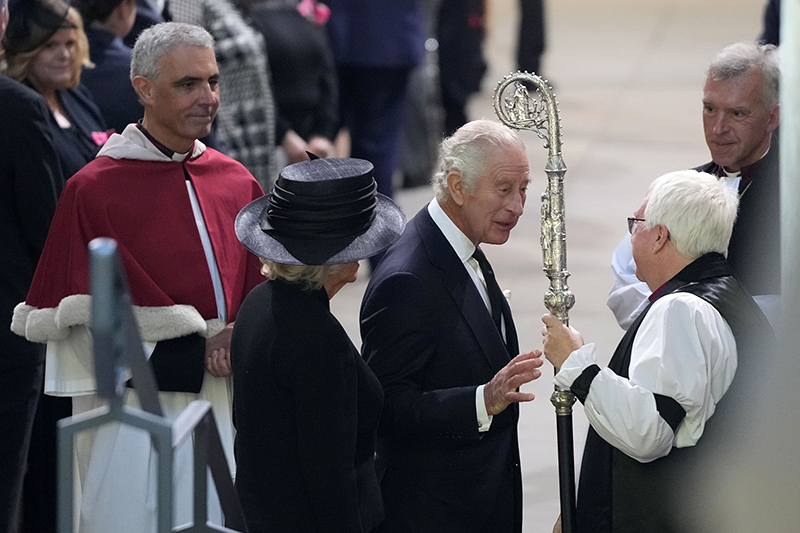
Britain’s King Charles III and Camilla, the queen consort, leave after a Service of Prayer and Reflection for the life of Queen Elizabeth II, at Llandaff Cathedral in Cardiff, Wales, Sept. 16, 2022. (AP Photo/Frank Augstein, Pool)
As we come to terms with what the British monarchy will look like in the post-Elizabethan era (can we recycle that term to speak of recent history?), I was interested in this article posted in Religion News Service on 21 September about the new king’s title Defender of the Faith and how King Charles may be interpreting it.
The term Defensor Fidei was first given to Henry VIII in 1521 by the Pope, when Henry was trying to curry favour with the papacy through a ghost-written tract he had put his name to, denouncing Martin Luther. As we know, Henry was quite willing later on to jettison Rome’s favour to gain his divorce from his first wife, Catherine. Readers who want to know more, and are looking for good fiction, are encouraged to read the late and lamented Hilary Mantel's novel Wolf Hall.
The title remained, and while the late Queen and her son have both maintained their membership in the Church of England and their Christian faith, there have been signs that the new King has envisioned the Crown being a guarantor of religions. As Prince of Wales, he controversially said that he thought the monarch should be “Defender of the Faiths”, and while he recanted that statement, the RNS article notes that there were many different faith/religious leaders present at funeral services for Queen Elizabeth.
An expansive view of religious freedom is probably the only course open to a constitutional monarch with a fragile authority over an increasingly pluralistic and secular nation. It is, however, the view that the late Queen took, as the RNS article notes:
In a landmark speech in 2012 at Lambeth Palace, the London home of the Archbishop of Canterbury, the queen said of the Church of England that “Its role is not to defend Anglicanism to the exclusion of other religions. Instead, the Church has a duty to protect the free practice of all faiths in this country.”
She credited the established church with having done so already. “Gently and assuredly, the Church of England has created an environment for other faith communities and indeed people of no faith to live freely,” she said.
Watching the funeral service for the Queen, one of my more conservative clergy colleagues jokingly suggested that the Crown on the flag-draped casket was a fitting symbol of Christian nationalism. I respectfully differ. When I was a chaplain in the Canadian Forces, as a religious functionary employed by the federal government, I came to the view that my role was to speak politically and socially for all faiths represented in Canada, while speaking pastorally and theologically only for my own. A chaplain’s role, I thought, was ultimately to guarantee the freedom of people of faith to be themselves. My sense is that the new King takes a similar view of the Crown’s role.


1 comment:
Nicely said, Padre. I know you speak from a wealth of experience.
Post a Comment